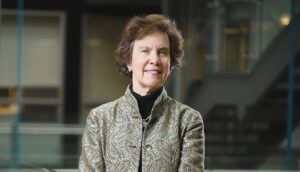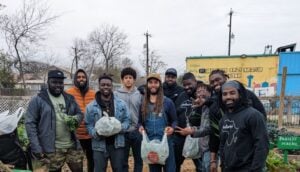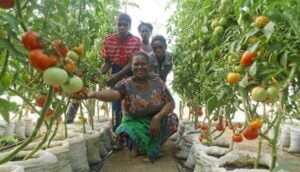On July 10 and 11, over 300 people came together for our annual flagship event, Business Fights Poverty Oxford 2017 at Saïd Business School, University of Oxford. The headline sponsor for the event was Mars Inc. It was held in association with the Center for Business and Poverty at the University of Wisconsin Madison and with the support of Diageo, IFC and a number of other partners.
Watch some of the highlights of the event in the 3-minute video below:
The theme of the event was “Rethinking Collaboration for Social Impact”. One of the sessions focused on research perspectives on this theme and featured Jane Nelson, Director, Corporate, Responsibility Initiative, Harvard Kennedy School and Kate Raworth, Senior Visiting Research Associate at Environmental Change Institute, University of Oxford. The session was moderated by Maggie De Pree, Global Director, League of Intrapreneurs. Watch the full video below!
This session’s speakers inspired delegates to move economics and business together into a 21st century co-operative model for change.
Kate defined the challenge facing donor economics today, using her ‘Doughnut’ model.
The SDGs aim to shift every person in the world out of the hole in the middle of the doughnut, below which minimum social standards are unmet. But there is a clear outer boundary set by an ecological ceiling, beyond which unacceptable tipping points for environmental issues are crossed.
This narrow ‘doughnut’ zone of sustainable progress serves as a compass for change. But overlaying actual progress metrics indicates a shortfall on every one of the social foundation dimensions, as well as 4 of the planetary boundaries – so will we be the generation that faces up to this and addresses the problems?
Organisations can respond at a number of levels, most of which are simply ineffective:
1. Doing nothing – if you can get away with it from a compliance point of view, why change, in a competitive world?
2. Doing what pays – responding to incentives such as taxation, quality marks, if there’s a clear business case then we could change.
3. Doing our fair share and no more – trying to ‘split the bill’, whilst driving a sense of entitlement to the areas where paid up and on quota
4. Doing no harm – aiming for a neutral net zero impact – but this model creates discrete circular systems, which do not reflect the way people and organisations use resources
5. Being generous and distributive – recognising that every system is interrelated in a circular ecosystem, from the farmers to the boardroom, with multiple interconnected stakeholders.
Jane identified 3 models for collaboration to help shift thinking through these mindsets, describing Kate’s ‘doughnut’ model as the most concise expression of the fundamental leadership challenge of our time for creating a sustainable future.
1. Financing and implementing local on-the-ground partnerships, ecosystems thinking at local level. Making sure capacity and core competency building with policy advocacy happens alongside delivery, for sustainable change.
2. Non-competitive business alliances, like CocoaAction – industry leaders being progressive and visionary, holding each other to account, in sectors ranging from mining to mobile communications.
3. The true ecosystem model, multi-stakeholder dynamic partnerships, where a shared vision enables large numbers of actors to collaborate innovatively to achieve systemic change. By far the most challenging, and of course the most effective, collaboration to achieve – such as the GAVI vaccine alliance.
For these collaborations to be effective, mindset shifts are vital – from a zero-sum, value-extracting, 20th century economic model, to a truly generative and layered-benefit approach, where respectful engagement and communication is the norm, and status quos can be challenged.
Developing nations provide models, of open-source thinking and ground-up transformation, using technology to leapfrog outdated structures – but western academia and business needs to catch up to this and break out of their silos.
Maggie closed the session by reminding delegates that change and collaboration depends on individuals being collectively courageous – through networks such as the one she founded, the League of Intrapreneurs.
We’re already busy getting ready for next year’s event, Business Fights Poverty Oxford 2018, and I’m excited to say that it will be even bigger and better! Over 800 people applied for one of the 300 places we had this year, so next year we have decided to move to a bigger venue – Keble College, Oxford. Find out more and register now for an early bird discount here: http://snipbfp.org/BFPOxford2018
Watch the full video of the Research Perspectives panel below:
This article incorporates the session summary produced for Business Fights Poverty by Maya Middlemiss.










